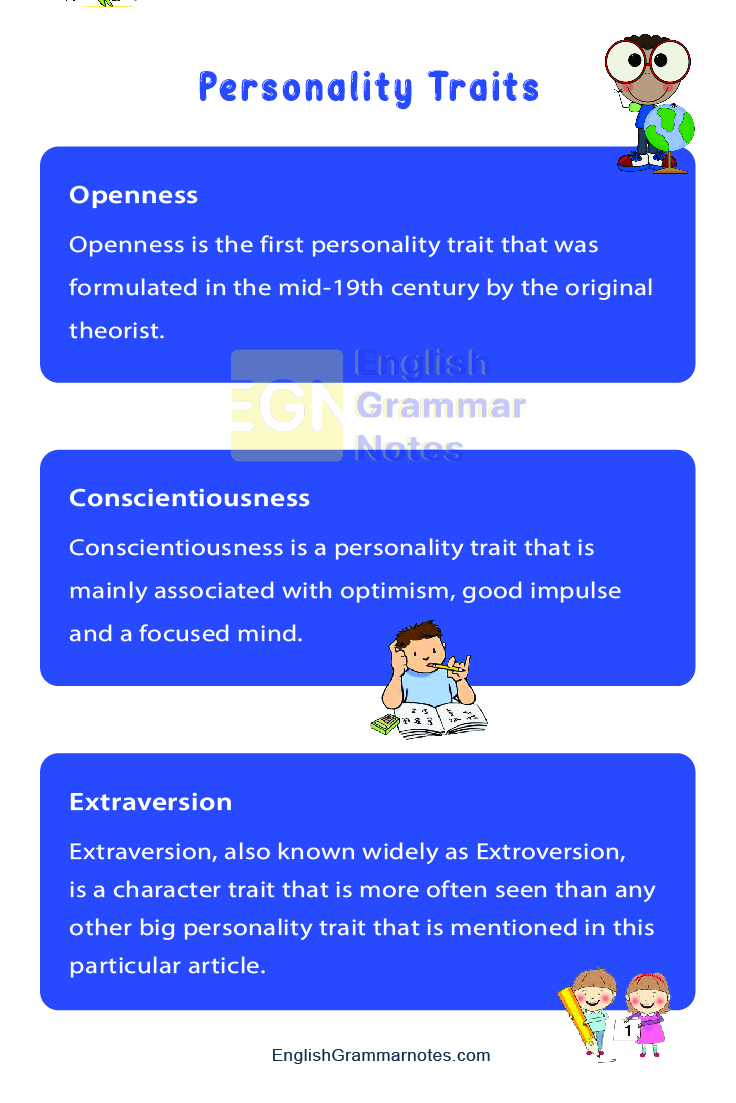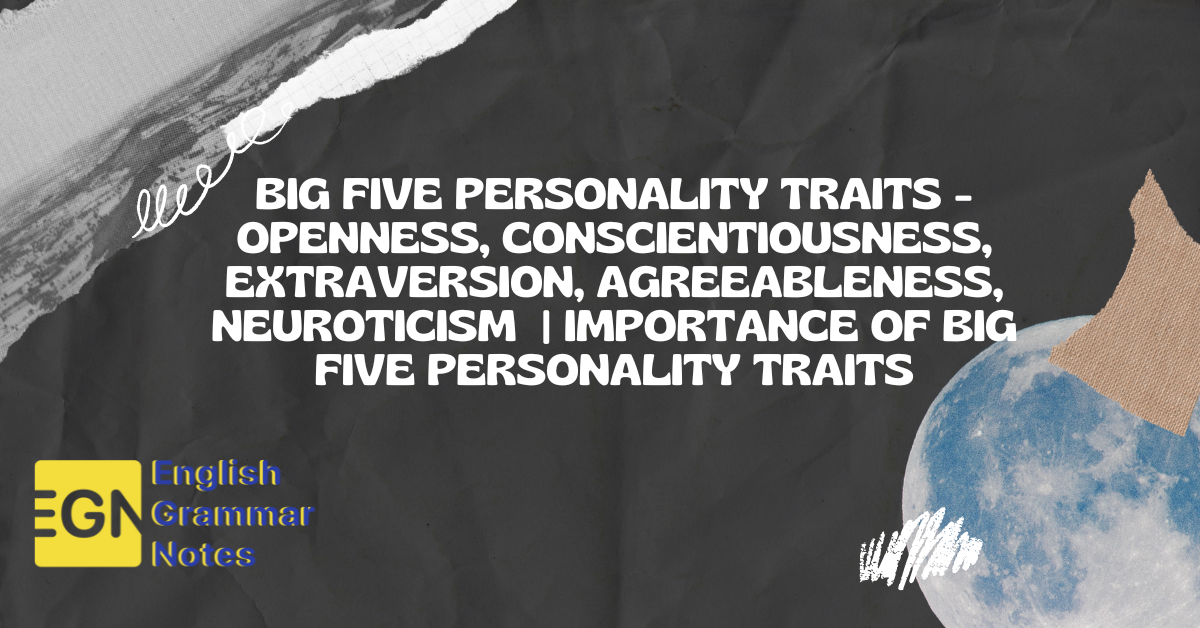The big five personality traits, as per studies and various psychology theories boil down to contentiousness, extraversion, agreeableness, neuroticism and openness. There are the main big five personality characteristics that were developed by scientists in the mid-19th century and we are going to discuss in detail the meaning of each of these personality traits in this particular article on big five personality traits.
The big five personality traits theory was developed by Fiske DW and Norman, Smith, Goldberg and McCrae and Costa. While Fiske DW was the original theorist for the big five personality traits, the other scientists and psychologists built upon his original theory across various timelines in the 19th century, right from the 1950s to the 1990s.
These 5 categories of personality traits have been researched over the century and across various definitions and cultures and have finally boiled on to 5 basic theories that we are going to describe in detail below in this particular article on the big 5 personality traits.
- What are the Big Five Personality Traits?
- What are the Factors that affect the Big Five Traits?
- How are Personality Traits Measured?
- Applications of Big Five Personality Traits
- Where are the big five personality traits used?
- Are big five personality traits universal?
- Who formulated the big five personality traits?
What are the Big Five Personality Traits?
The big five personality traits that we are going to mention here are well validated and used by psychologists and human resource theorists for over a century now. These traits are going to help one understand the nuances of Human Behaviour.
Openness
Openness is the first personality trait that was formulated in the mid-19th century by the original theorist. Openness, in simple words, can be described as a trait where a person is readily open to learning new things and adopting and adapting to different ways of life. In other words, a person whose mental stature is flexible enough to absorb new and different things, ones that are from a different perspective than one’s self, can be termed an open-minded person.
One’s ability to comprehend and digest different perspectives is an important and highly required characteristic trait in today’s competitive 22nd century. One has to have a broad mental horizon to survive the ever-competitive and cutthroat society like ours.
This trait comes with it several other positive characteristics in a person such as creativity, socializing, innovativeness, leadership abilities etc. The thought process that leads to creativity is very useful in a professional and corporate setup which is going to help a person grow in the right direction.
Socializing is one of the biggest plus points of openness. Having an open mind will let a person mingle with others easily, make friends and build a network that is going to be useful, both personally and professionally.
One who isn’t open can be termed as a rigid and highly principled person. Not having an open-minded mentality is not necessarily a negative trait either.
Conscientiousness
Conscientiousness is a personality trait that is mainly associated with optimism, good impulse and a focused mind. A conscientious person is someone who is a highly goal-oriented and well-organised person. People with this personality trait have a very well-structured lifestyle.
Most of the successful people in the world, across the spectrum such as politics, sports, business, entertainment or civil society, are conscientious people. They lead their life exactly how they had planned them. They will have a strategy in mind and they plan things ahead of time. In a professional setup, the skill of organisation is one of the single most important aspects. There is a whole lot of full-fledged subject specialisation in academic circles regarding organisational structure and organisational behaviours.
The importance of conscientiousness can be seen in an office environment. Whether it’s engineering, HR, marketing, operations, production, support, project management etc, a well-organised team and work always lead to efficiency and success.
People who tend to have low conscientiousness can have a very haywire lifestyle, one that is filled with impulsive acts, procrastination and laziness, to say the least.
Extraversion
Extraversion, also known widely as Extroversion, is a character trait that is more often seen than any other big personality trait that is mentioned in this particular article. Extroversion is that characteristic trait that is directly linked with plenty of other traits that counts as positive ones and that is going to help one socialise in society. In basic terms, extroversion can be defined as a characteristic trait where one gets energised in social gatherings and among fellow beings.
The other character traits that come bundled along with extroversion are talkativeness, assertiveness, expressiveness, emotional intelligence etc., Which are some of the most required traits in corporate and professional settings, not to mention in personal life as well.
The exact opposite of the character trait of extroversion is introversion which means people who prefer solitude and have less energy in social gatherings and interactions. One cannot make a statement that one is better than the other because both extroversion and introversion have their pros and cons and depends on the particular circumstances and social situations.

Agreeableness
Agreeableness is a characteristic trait where one tends to agree or have prosocial behaviour among others and exhibit other side characteristic traits such as kindness, affection, trust and altruism. Highly agreeable people or people that exhibit an extreme amount of agreeableness are more often than not socially likeable and are inclined to have a better network than people that possess less degree of agreeableness in their personality.
Being flexible, being cooperative and having a kind nature can be defined as agreeableness and all this leads to empathetic behaviour that is highly required in a competitive and to put it in harsh words, cruel society like ours.
Disagreeableness is different from being rigid and principled and one shouldn’t be confused between the two.
Neuroticism
Neuroticism is a particularly negative character trait amongst all the big five personality traits mentioned in this write-up. Neuroticism is mainly associated with mood swings, anxiety, depression, moodiness, sorrow and unhappiness. People with neuroticism exhibit and experience a lot of mental and physical stress that is associated with anxiousness, shifting in mood and struggling to bounce back after a setback in life. The setbacks that are associated with neuroticism can be short-term as well as long-lasting and it requires medical attention to be treated in the highest order.
While negative emotions are associated with people with high neuroticism traits, on the other hand, people who have a low magnitude of neuroticism traits or are mentally and emotionally stable can handle stress themselves without depending on chemicals and western medicine, as well as have a more structured and relaxed lifestyle.
What are the Factors that affect the Big Five Traits?
As per the original research and various other research that is built upon the big five personality traits, there are a few factors that influence the big five personality traits and as per psychologists and scientists, these factors that influence the traits are universal, which means that the same factors affect the traits across the spectrum of social, economic, societal, geographic and racial backgrounds.
Below we have mentioned a few of the factors that influence the big 5 personality traits:
- Genetic background: It is no secret anymore that, like begets like, has a serious impact on our society and organisational behaviour.
- Environmental background: One must have observed that the cultures and daily lifestyles of people depend mainly on the kind of environment in which they are present. The kind of people you meet on the sea shore is very different from the kind of people you meet in the mountainous regions of the world and likewise, the behavioural and personality traits of each individual highly vary depending on their environmental upbringing.
- Social background: the kind of lifestyles and personality traits that a person living in a poche locality at Beverly hills might be very different from the individuals who live in downtowns and not so-developed areas and hence social and societal impact has a greater influence on the personality traits of an individual
- Financial background: Most of the personality traits that are mentioned above are diverse and vary in magnitude and one of the most influencing factors is the financial background of an individual.
Boost up your confidence levels while speaking the English Language in classrooms, interviews, with the help of our free download English Grammar Notes.
How are Personality Traits Measured?
As per the original theorists in the mid-19th century, the big five personality traits were formulated and measured by a simple survey and questionnaire that people with different ethnic, social and societal backgrounds were given and they were rated with a cumulative score.
The question is designed in such a way that they range from professional, personal, emotional, logical and critical reasoning questions that are going to evaluate a person’s thought process and behavioural and decision-making abilities.
The aim of the questions is basically to judge a person’s openness, conscientiousness, extraversion, agreeableness and neuroticism and grade the magnitude of these personality traits in their lifestyle.
Applications of Big Five Personality Traits
The following are some of the areas where Big 5 personality traits can be made use of
- Recruitment and HR relations: Human resource management is a wide variety of science and study of psychology that is applicable in the big corporates and organisations across countries and industries. It becomes of utmost importance for an organisation to hire the right person for the right job and analyse the big five personality traits in an individual as per the job role that he or she is applying for.
- Sales and Marketing: Brands today market and sell their product not by actually talking about the product but by talking about the feeling and experience surrounding the product. Apple as a brand doesn’t sell the product, but they sell the experience of feeling luxury and premiumness. In the same way, if you observe the branding of Coca-Cola or Pepsi, they don’t sell soda but what they are selling is the feeling of happiness and enjoyment. To put it in simple words, brands play with the emotional intelligence and the need for validation of a person to sell their products and services
- Personal relationships: the usage and the learning that is taken from the big five personality traits theories can be used in developing personal relationships with families, spouses and children. Developing relationships on a personal level with colleagues and clients can also help build a strong professional network that is going to help one in the long run.
See More:
FAQs on Big Five Personality Traits PDF
1. Where are the big five personality traits used?
The theory of big five personality traits is used in Human Resources, recruitment, marketing strategies, etc.
2. Are big five personality traits universal?
Since this theory is validated across the world by different scientists, the big five personality traits are universal in nature
3. Who formulated the big five personality traits?
Big five personality traits were formulated by D W Fiske in 1949.
